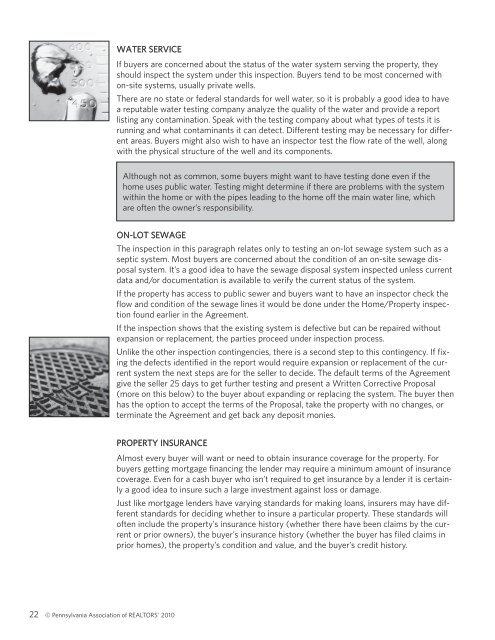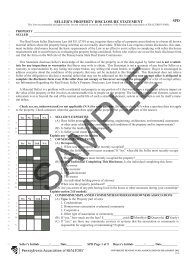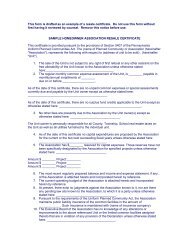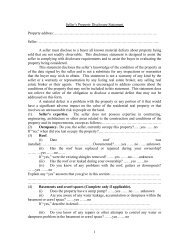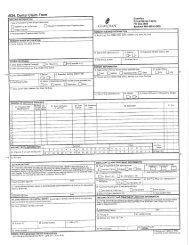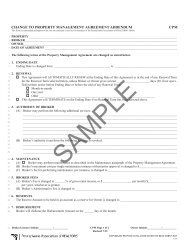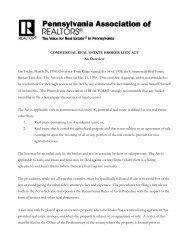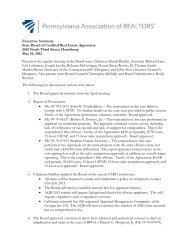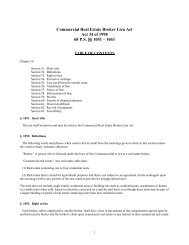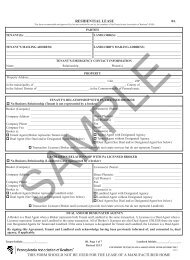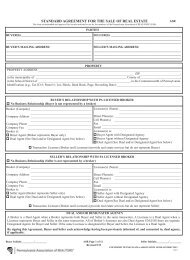consumer's guide to the agreement of sale - Pennsylvania ...
consumer's guide to the agreement of sale - Pennsylvania ...
consumer's guide to the agreement of sale - Pennsylvania ...
You also want an ePaper? Increase the reach of your titles
YUMPU automatically turns print PDFs into web optimized ePapers that Google loves.
WATER SERVICE<br />
If buyers are concerned about <strong>the</strong> status <strong>of</strong> <strong>the</strong> water system serving <strong>the</strong> property, <strong>the</strong>y<br />
should inspect <strong>the</strong> system under this inspection. Buyers tend <strong>to</strong> be most concerned with<br />
on-site systems, usually private wells.<br />
There are no state or federal standards for well water, so it is probably a good idea <strong>to</strong> have<br />
a reputable water testing company analyze <strong>the</strong> quality <strong>of</strong> <strong>the</strong> water and provide a report<br />
listing any contamination. Speak with <strong>the</strong> testing company about what types <strong>of</strong> tests it is<br />
running and what contaminants it can detect. Different testing may be necessary for different<br />
areas. Buyers might also wish <strong>to</strong> have an inspec<strong>to</strong>r test <strong>the</strong> flow rate <strong>of</strong> <strong>the</strong> well, along<br />
with <strong>the</strong> physical structure <strong>of</strong> <strong>the</strong> well and its components.<br />
Although not as common, some buyers might want <strong>to</strong> have testing done even if <strong>the</strong><br />
home uses public water. Testing might determine if <strong>the</strong>re are problems with <strong>the</strong> system<br />
within <strong>the</strong> home or with <strong>the</strong> pipes leading <strong>to</strong> <strong>the</strong> home <strong>of</strong>f <strong>the</strong> main water line, which<br />
are <strong>of</strong>ten <strong>the</strong> owner’s responsibility.<br />
ON-LOT SEWAGE<br />
The inspection in this paragraph relates only <strong>to</strong> testing an on-lot sewage system such as a<br />
septic system. Most buyers are concerned about <strong>the</strong> condition <strong>of</strong> an on-site sewage disposal<br />
system. It’s a good idea <strong>to</strong> have <strong>the</strong> sewage disposal system inspected unless current<br />
data and/or documentation is available <strong>to</strong> verify <strong>the</strong> current status <strong>of</strong> <strong>the</strong> system.<br />
If <strong>the</strong> property has access <strong>to</strong> public sewer and buyers want <strong>to</strong> have an inspec<strong>to</strong>r check <strong>the</strong><br />
flow and condition <strong>of</strong> <strong>the</strong> sewage lines it would be done under <strong>the</strong> Home/Property inspection<br />
found earlier in <strong>the</strong> Agreement.<br />
If <strong>the</strong> inspection shows that <strong>the</strong> existing system is defective but can be repaired without<br />
expansion or replacement, <strong>the</strong> parties proceed under inspection process.<br />
Unlike <strong>the</strong> o<strong>the</strong>r inspection contingencies, <strong>the</strong>re is a second step <strong>to</strong> this contingency. If fixing<br />
<strong>the</strong> defects identified in <strong>the</strong> report would require expansion or replacement <strong>of</strong> <strong>the</strong> current<br />
system <strong>the</strong> next steps are for <strong>the</strong> seller <strong>to</strong> decide. The default terms <strong>of</strong> <strong>the</strong> Agreement<br />
give <strong>the</strong> seller 25 days <strong>to</strong> get fur<strong>the</strong>r testing and present a Written Corrective Proposal<br />
(more on this below) <strong>to</strong> <strong>the</strong> buyer about expanding or replacing <strong>the</strong> system. The buyer <strong>the</strong>n<br />
has <strong>the</strong> option <strong>to</strong> accept <strong>the</strong> terms <strong>of</strong> <strong>the</strong> Proposal, take <strong>the</strong> property with no changes, or<br />
terminate <strong>the</strong> Agreement and get back any deposit monies.<br />
PROPERTY INSURANCE<br />
Almost every buyer will want or need <strong>to</strong> obtain insurance coverage for <strong>the</strong> property. For<br />
buyers getting mortgage financing <strong>the</strong> lender may require a minimum amount <strong>of</strong> insurance<br />
coverage. Even for a cash buyer who isn’t required <strong>to</strong> get insurance by a lender it is certainly<br />
a good idea <strong>to</strong> insure such a large investment against loss or damage.<br />
Just like mortgage lenders have varying standards for making loans, insurers may have different<br />
standards for deciding whe<strong>the</strong>r <strong>to</strong> insure a particular property. These standards will<br />
<strong>of</strong>ten include <strong>the</strong> property’s insurance his<strong>to</strong>ry (whe<strong>the</strong>r <strong>the</strong>re have been claims by <strong>the</strong> current<br />
or prior owners), <strong>the</strong> buyer’s insurance his<strong>to</strong>ry (whe<strong>the</strong>r <strong>the</strong> buyer has filed claims in<br />
prior homes), <strong>the</strong> property’s condition and value, and <strong>the</strong> buyer’s credit his<strong>to</strong>ry.<br />
22 © <strong>Pennsylvania</strong> Association <strong>of</strong> REALTORS ® 2010


